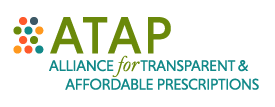ATAP Press Release: Executive Order to Lower Prescription Drug Prices by Eliminating Kickbacks to Middlemen Must be Enforced
FOR IMMEDIATE RELEASE
July 28, 2020
CONTACT
Dan Rene of kglobal
202-329-8357 or daniel.rene@kglobal.com
EXECUTIVE ORDER TO LOWER PRESCRIPTION DRUG PRICES BY ELIMINATING KICKBACKS TO MIDDLEMEN MUST BE ENFORCED
Pharmacy Benefit Managers May Be Saved by ‘Poison Pill’
[Washington, DC] [July 28, 2020] – An Executive Order to eliminate kickbacks to pharmacy benefit managers (PBMs) signed by President Trump on Friday July 24, 2020 is being met with cautious optimism by medical professionals and patients advocates from the Alliance for Transparent and Affordable Prescriptions (ATAP.) Many health industry insiders worry, however, that the Executive Order, as written, may make it practically difficult for the Health and Human Services (HHS) Secretary to revive the “rebate rule,” meaning that the drastically reduced prices that could result may never become a reality for patients.
“The policy making process in the coming weeks will determine if this Executive Order has teeth,” stated ATAP’s President Dr. Robert Levin. “This has the opportunity to be major victory for patients but could also fall flat if HHS fails to move forward because of the limiting language in the Order. For far too long, the PBM industry has been generating significant profits while patients struggle to afford the cost of prescription drugs. PBMs owe it to patients to pass along savings and the rebates received on to the patient.”
HHS Secretary Alex Azar along with other elected and appointed policy makers in Washington have been hearing about the PBM problem for years from ATAP and its member organizations – making this historic action one that shows the efforts from these patient advocacy organizations are having a positive impact.
“These leaders know what needs to be done,” Dr. Levin continued. “While it may be difficult for the PBM industry and insurance companies to forgo some of their profits, it is the right thing to do.”
The Executive Order explains the problem with PBMs by starting:
One of the reasons pharmaceutical drug prices in the United States are so high is because of the complex mix of payers and negotiators that often separates the consumer from the manufacturer in the drug-purchasing process. The result is that the prices patients see at the point-of-sale do not reflect the prices that the patient’s insurance companies, and middlemen hired by the insurance companies, actually pay for drugs. Instead, these middlemen — health plan sponsors and pharmacy benefit managers (PBMs) — negotiate significant discounts off of the list prices, sometimes up to 50 percent of the cost of the drug. Medicare patients, whose cost sharing is typically based on list prices, pay more than they should for drugs while the middlemen collect large “rebate” checks. These rebates are the functional equivalent of kickbacks, and erode savings that could otherwise go to the Medicare patients taking those drugs. Yet currently, Federal regulations create a safe harbor for such discounts and preclude treating them as kickbacks under the law.”
Section three of the Order calls for establishing “new safe harbors that would permit health plan sponsors, pharmacies, and PBMs to apply discounts at the patient’s point-of-sale in order to lower the patient’s out-of-pocket costs, and that would permit the use of certain bona fide PBM service fees.”
The Executive Order also prohibits the Secretary from moving forward if Medicare premiums might rise even a single dollar – which some say could be the ‘poison pill’ in preventing the implementation of this policy.
“Patients today are suffering under a system that prevents them from getting medicine they need. The PBM industry profits significantly off rebates while interrupting the provider-patient relationship, solely to increase its own profits,” Dr. Levin continued. “With the Executive Order in place, a light is now shining on the previously hidden profit motives of the PBM industry. Patients, physicians, and policy makers now have the power to effect meaningful change. I am proud of the role ATAP holds in reforming the rebate system and look forward to working with Washington to move the rule making process forward to-that-end.”
With regard to the other three Executive Orders, ATAP looks forward to engaging in the regulatory process, but reiterates its previous comments on the Administration’s existing importation and International Pricing Index proposals: expanding PBMs’ power to insert themselves into drug importation and Medicare Part B is a nonstarter, given the detrimental effect these entities in their current form already have on patient care.
ATAP is working in many states to force the PBM industry to disclose rebate data and encourage transparency and reporting requirements for all entities involved in the prescription drug supply chain – PBMs, insurers, and manufacturers.
###
To schedule an interview with Dr. Levin or another ATAP spokesperson, please contact Dan Rene of kglobal at 202-329-8357.
Please visit http://www.atapadvocates.com
